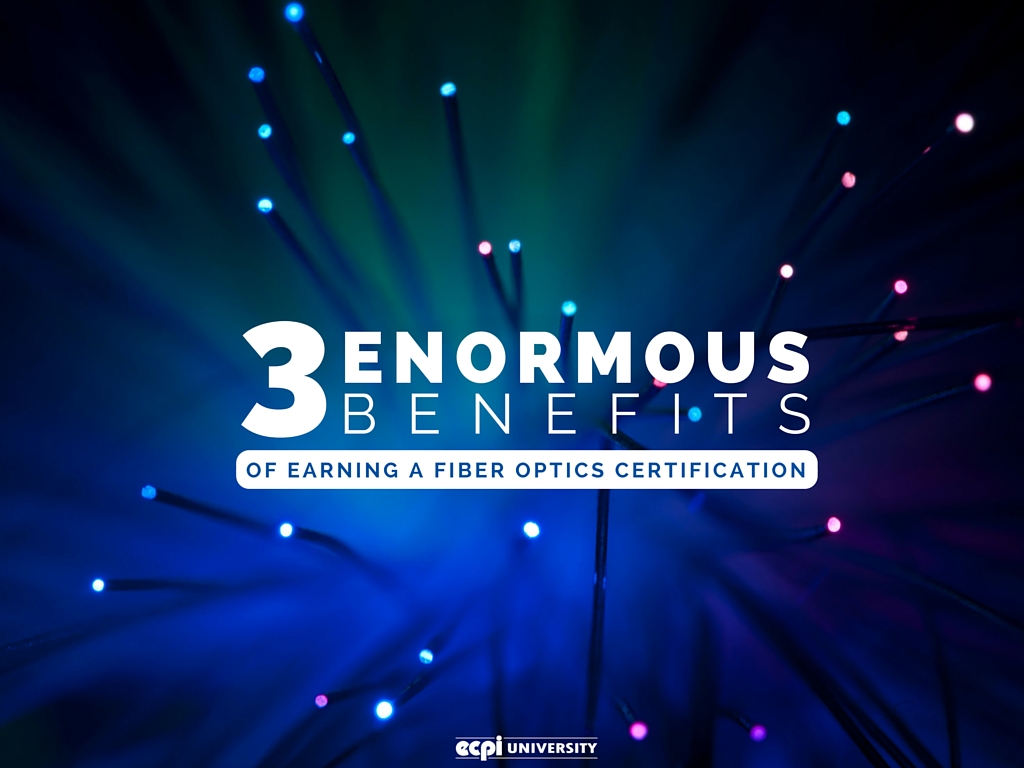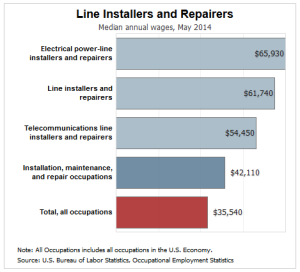3 Enormous Benefits of Earning a Fiber Optics Certification

Each year, our world becomes ever-more dependent on data and our ability to transmit it. There are few aspects of modern life that electronics and information technology do not touch and shape – from business and finance, to social communication and entertainment, to government, military, and scientific exploration. In a very real sense, the fabric of our society is woven from fiber optic cable. The ability to design, install, maintain, and utilize this technology is essential to sustaining our technology-focused culture, both now and moving into the future.
Career Opportunities for Fiber Optic Technicians
 Because the need for fiber optic data transmission is so pervasive, the career opportunities in fiber optics are diverse. Depending on their area of specialization and other training, a certified fiber optic technician may find employment as a line installer, working outdoors in manholes or atop utility poles, or performing installation and troubleshooting in customers’ homes and business locations. According to the Bureau of Labor Statistics (BLS), telecom line installation and repair workers earned a median annual wage of $54,450, as of May 2014. Line workers are also more likely than the average worker to be offered union membership.
Because the need for fiber optic data transmission is so pervasive, the career opportunities in fiber optics are diverse. Depending on their area of specialization and other training, a certified fiber optic technician may find employment as a line installer, working outdoors in manholes or atop utility poles, or performing installation and troubleshooting in customers’ homes and business locations. According to the Bureau of Labor Statistics (BLS), telecom line installation and repair workers earned a median annual wage of $54,450, as of May 2014. Line workers are also more likely than the average worker to be offered union membership.
The Fiber Optic Association (FOA), an international non-profit society for fiber optic industry professionals, also states that full-time workers in these positions receive generous benefits packages as part of their compensation. The industry also continues to need trained and certified individuals who can design fiber optic systems and local area networks, which would then be installed and maintained by other fiber optic industry workers.
The Benefits of Being Fiber Optics Certified
In almost all cases, certification by the Electronics Technicians Association (ETA) is a substantial advantage for those pursuing careers in fiber optics. The benefits of attaining certification are nearly as varied as the potential career paths in the field, and include:
- Being recognized as the best. The ETA uses competency standards drawn from the international community for its certification exams, and maintains membership in the International Certification Accreditation Council. The ICAC audits its members’ programs on a five-year schedule to ensure that they have kept up with industry developments and continue to adhere to the highest standards. In addition, a feasibility study by the National Skills Standards Board determined that the ETA electronics certification programs ranked among the best available industry certifications. Employers who see an ETA fiber optic certification on your resume are likely to recognize it as a sign of quality training and competence in the field.
- The opportunity for mastery. Each certification exam is reviewed on a yearly basis (at minimum) by a group of subject matter experts, educators, representatives of several national associations, and ETA staff members to ensure that the material contained in the exams is up to date and in compliance with current industry standards. Candidates who receive their certification can be confident that the knowledge they have demonstrated reflects the best understanding of their field that the industry has to offer.
- A fair and objective assessment. The ETA works to keep their fiber optic certification programs free from bias, either toward any vendor or product, or against any demographic of certification candidate. The programs offered by ETA comply with anti-discrimination and civil rights standards.
What Are the Top Fiber Optics Certifications?
There are several distinct fiber optic certification programs available, enabling students to focus on the area of their particular interest and opening up the possibility for opportunities in specific segments of the fiber optic industry. Students can pursue certifications as a fiber optics installer (CFOI), technician (CFOT), or designer (CFOD). Each fiber optics certification course has a unique focus and requirements, preparing students for the aspect of the field best suited to their interests and career aspirations.
Fiber Optics Installer (ETA Certified)
In addition to providing a grounding in the basic components and theory of fiber optics principles, the major features of the technology, and industry terms, this fiber optic certification course trains students in the methods of building, splicing, and testing fiber optic cable systems.
Fiber Optics Technician (ETA Certified)
This fiber optic certification training program gives candidates a strong grounding in the skills and knowledge needed to understand how fiber optic networks function – and to recognize and identify problems when they’re not working correctly. Coursework includes certifying and troubleshooting model cable systems designed to include common problems.
Fiber Optics Designer (ETA Certified)
Students in this course learn all aspects of fiber optic network design, including industry communications standards and hardware selection. This is a newer program, arming students with extensive knowledge of fiber optic local area networks.
If the idea of working at the forefront of fiber optic communications technology and helping to sustain our data-driven world appeals to you, contact ECPI University and find out how to earn your ETA Fiber Optics certification.
DISCLAIMER – ECPI University makes no claim, warranty, or guarantee as to actual employability or earning potential to current, past or future students or graduates of any educational program we offer. The ECPI University website is published for informational purposes only. Every effort is made to ensure the accuracy of information contained on the ECPI.edu domain; however, no warranty of accuracy is made. No contractual rights, either expressed or implied, are created by its content.

